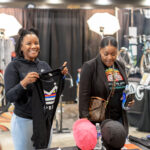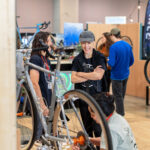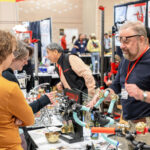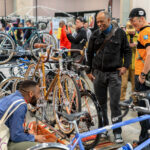
The Philly Bike Expo celebrated its 10th anniversary with its largest number of exhibitors, more show attendees than ever before, and arguably its best-ever schedule of seminars.
There were so many seminars that we couldn’t get to them all. Many of the ones that we have not addressed here were captured on video, and we’ll post up full videos and/or highlights shortly.
Two significant themes of the Philly Bike Expo this year were diversity and inclusivity. These are topics that are long overdue for the bicycle industry to address in a meaningful way, and by the end of the show, problems had not been solved, but at least a productive dialogue was begun.
This year’s PBE, perhaps more than any previous edition, was Janus-faced. Like the Roman deity Janus, who had two faces fore and aft, the show looked back on the rich history of cycling, and looked forward to a better, more inclusive future.
PBE looked back on the past with seminars featuring a focus on the 1970s, a salient decade for the bike business in America. A seminar on Saturday addressed the establishment of some big framebuilder names in the industry, Chris Chance, Tom Ritchey, Mark Nobilette and Richard Schwinn, and another covered the U.S. based Raleigh team’s participation in the 1973 Tour of Ireland, one of the first big European stage races contested by American riders.

The seventies were addressed again on Sunday with a seminar led by Mike Kone of Boulder Bicycle that covered the re-emergence of the 1970s road bike as an ideal steed for today’s gravel and randonneur rides. Long before gravel races became a thing, bikes of the 1970s were gravel bikes by default, made to handle different road surfaces with wider tires, adjustable rear dropouts and powerful centerpull brakes. The reemergence of these elements on custom gravel bikes today is a testament to their suitability for gravel riding. It also means that deals on long-forgotten garage dwellers can be had, for those not yet able to invest in a custom bike. Kone showed some examples of these neo-retro hybrids.
While these seminars looked on cycling’s past, another set of seminars looked toward a better future. The elephant in the room, diversity, was addressed through the establishment of the SRAM/PBE Inclusivity Scholarship, an initiative meant to promote the contributions of women, trans and POC frame builders, groups traditionally under-represented in the bicycle industry. Conceived by journalist and industry stalwart Anna Schwinn and PBE Director Bina Bilenky, the scholarship came about through the generous support of SRAM. This year’s scholarship recipients were Julie Ann Pedalino of Pedalino Bicycles, Jackie Mautner of Untitled Cycles, Megan Dean of Moth Attack, and Danielle Schon of Schon Studio.
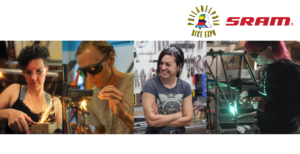
“While the bicycle brings great freedom, the bike industry itself is not always the most welcoming place,” said SRAM Road Brand Manager Kate Powlison. “At SRAM, we aim to support the people, groups, and events working to change that. The energy that small builders bring is super inspiring. We want to recognize them and help shine a spotlight on these four amazing builders who come from underrepresented groups in the industry.”
While companies like SRAM are putting their resources behind diversity and inclusivity in the bicycle industry, others have a checkered past trying to portray and promote a diverse marketplace.

Ayesha McGowan is on the fast track to become the first African-American female road professional cyclist. In her seminar titled “Representation Matters,” McGowan related her own struggles with proper representation of minority communities in the bicycle industry. As companies use media to portray the idea that people who ride bicycles come from all backgrounds, McGowan stressed the need to avoid “tokenization” of underrepresented communities.
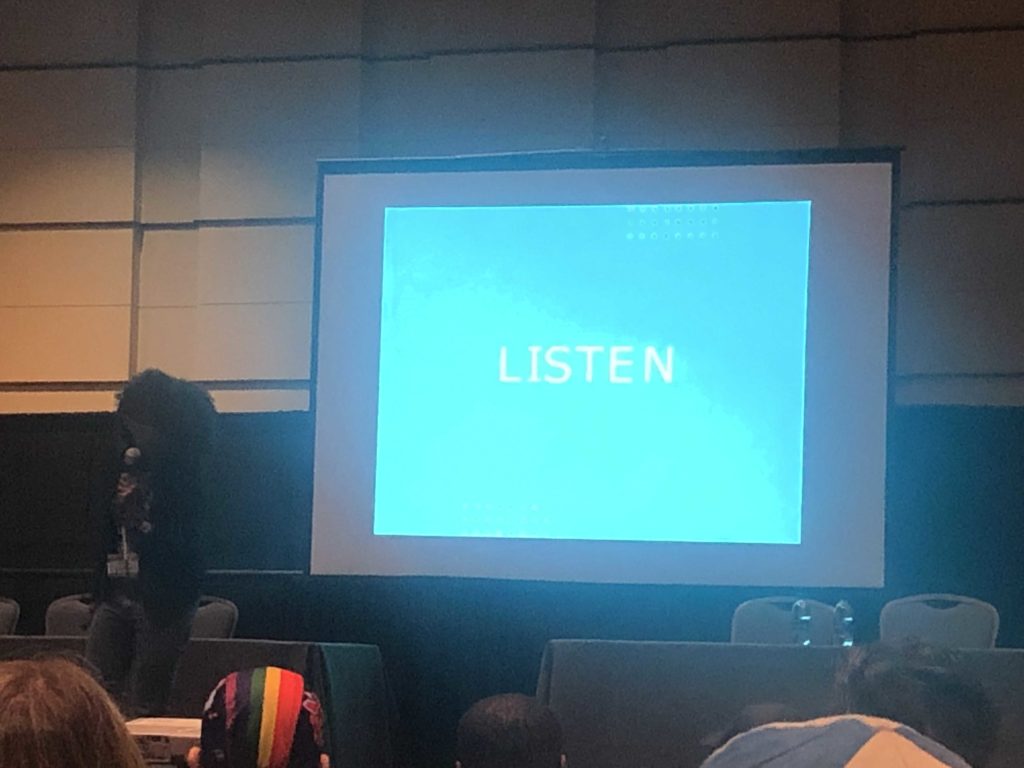
McGowan outlined an action plan for encouraging companies to promote inclusivity. The key to making lasting and meaningful changes, she said, is to educate and never to compel representation. McGowan said that perhaps the most useful tool was an open dialogue with industry leaders that involves listening and understanding different perspectives more than shouting or preaching. As Indira Gandhi once famously put it, “a closed fist shakes no hands.” You can read more about McGowan at her website, www.aquickbrownfox.com.
With several other seminars devoted to bicycle advocacy, this year’s PBE seminar schedule addressed the full canvas of the bicycle industry in the U.S.. While it celebrated cycling’s history, it didn’t gloss over the shortcomings of its past. With responsible companies like SRAM and intelligent, well-spoken agents for change like Ayesha McGowan, the future of cycling in the U.S. looks better, more diverse and more equitable indeed.




